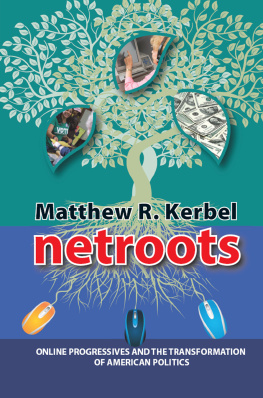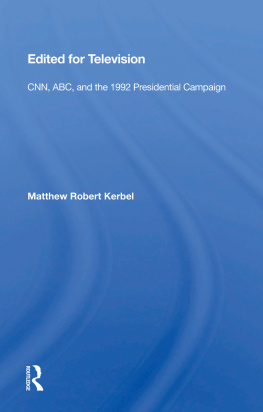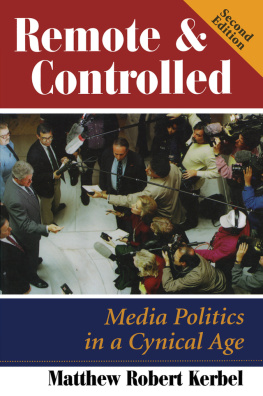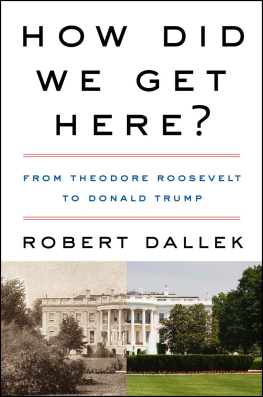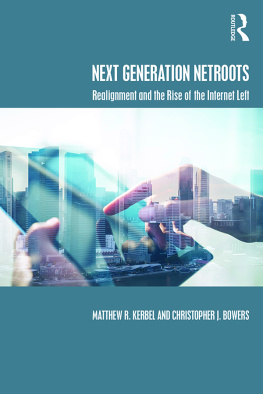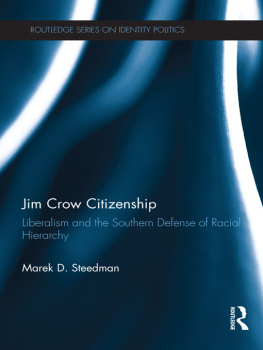First published 2009 by Paradigm Publishers
Published 2016 by Routledge
2 Park Square, Milton Park, Abingdon, Oxon OX14 4RN
711 Third Avenue, New York, NY 10017, USA
Routledge is an imprint of the Taylor & Francis Group, an informa business
Copyright 2009, Taylor & Francis.
All rights reserved. No part of this book may be reprinted or reproduced or utilised in any form or by any electronic, mechanical, or other means, now known or hereafter invented, including photocopying and recording, or in any information storage or retrieval system, without permission in writing from the publishers.
Notice:
Product or corporate names may be trademarks or registered trademarks, and are used only for identification and explanation without intent to infringe.
Library of Congress Cataloging-in-Publication Data
Kerbel, Matthew Robert, 1958
Netroots : online progressives and the transformation of American politics / Matthew R. Kerbel.
p. cm. (Media and power)
Includes bibliographical references and index.
ISBN 978-1-59451-494-4 (hardcover : alk. paper) ISBN 978-1-59451-495-1 (pbk. : alk. paper)
1. Political participationTechnological innovationsUnited States. 2. BlogsPolitical aspectsUnited States. 3. InternetPolitical aspectsUnited States. 4. United States Politics and government2001
I. Title.
JK1764.K47 2009
320.973dc22
2008055633
Designed and Typeset by Straight Creek Bookmakers.
ISBN 13: 978-1-59451-494-4 (hbk)
ISBN 13: 978-1-59451-495-1 (pbk)

In 1999, I published a book called Remote and Controlled about how television was damaging our national discourse and undermining our collective sense of political well-being. An entertainment medium by nature, television, I contended, was ill-suited to the task of informing us about and engaging us in politics. Television shows are staged events; theyre fake. And while politics has always been part spectacle, television emphasizes the show at the expense of everything else. It invites us to passively and uncritically share its obsessive attention to the strategies and tactics of political campaigning, to media events designed to sway our emotions, to the use and manipulation of symbols and images offered up for our amusement. And it hypnotically insists that its pictures and words wash over us as we stare motionless from a comfortable chair, passively absorbing the message that politicians are disingenuous, that theyre all alike, that the political system isnt worth our time or effort. No wonder so many people were cynical about the political process during the television age.
When I shared the manuscript with my editor, she told me that all this was fine, but I hadnt ended the book with a solution to the problem. I was at a loss. I told her that I didnt see a solution to the problem, or at least I didnt see a realistic one. Others who had written on this subject and wrestled with similar problems had tried to offer solutions, and while I appreciated their efforts as well-meaning, I simply didnt see how we were going to diminish the pivotal role television played in American life at the end of the millennium. Suggestions about strengthening political parties at the expense of television, developing standards to require journalists to behave more responsibly, or somehow kindling a new participatory spark in a video-addled culture, no matter how thoughtful or creative, were not likely to happen. And I couldnt come up with anything better.
My editor was not convinced. If I wanted people to wade through 50,000 words detailing how bad things are, I couldnt leave them in despair. I had to at least offer a semblance of hope.
So I gave it a shot. In my classroom, I invite my students to look at television as an unnatural entity, as something that slices and chops reality into an edited product that seductively looks like real life but is in fact nothing of the sort. What if, I wondered, others could begin to look at television in this way? They could become knowledgeable consumers of political messages, and that might diminish televisions more detrimental effects. Imagine if people started talking back to their televisions! I had no idea how this would come to pass, but I liked the sentiment and believed it to have merit. So thats how I ended my book, with a plea for education. It was the best I could do at the time.
Several years later, I noticed something strange. People on primitive websites were beginning to express their views about politics to no one in particular through something called weblogs. Their numbers were small and the technology was rudimentary, but they were out there and they were behaving in ways that television never inspired people to act. Our political dramas had turned unsettled with the Clinton impeachment and the stalemated 2000 election, then dark and foreboding following the terrorist attacks of 2001 and the subsequent invasions of Afghanistan and Iraq, turning the page on the complacency of the 1990s. And here was this emerging medium giving those with the means to afford a computer and Internet access a way to express outrage or enthusiasm for what was happening in the political world. That hadnt been happening before.
So I began to wonder: Could computers be the antitelevision? Could it be that technology and the way people used it might supply an innovative solution to the dilemma that I was unable to address in a realistic way several years before?
It was difficult to know. All sorts of predictions were being made about what the Internet would produce. It was going to revolutionize the world and change the way we relate to each other. Or it was an overblown fad, a latter-day hula hoop that would have its moment and then inevitably recede into the distance. In truth, no one knew what was going to happen because no one could predict how the technology would evolve. But I couldnt shake the thought of those ordinary people expressing themselves online for no reason other than they wanted to and they could.
I went back to my editor with the idea for what would become this book. At the timebecause she couldnt see the future eithershe said it was too soon: no one would know what to make of a book about the Internet. And her instincts were correct. In the intervening five years, as the technology continued its steep march up the growth curve, weblogs have moved into the mainstream and a movement has developed among those on the digitally connected left. By 2006, they were claiming their share of success for the strong performance of Democrats in that years midterm elections, as they pushed to reshape national politics in their image. Had I not waited, I would have missed the start of what could be a profound change in national politics, spearheaded by the emergence of this new technology.






